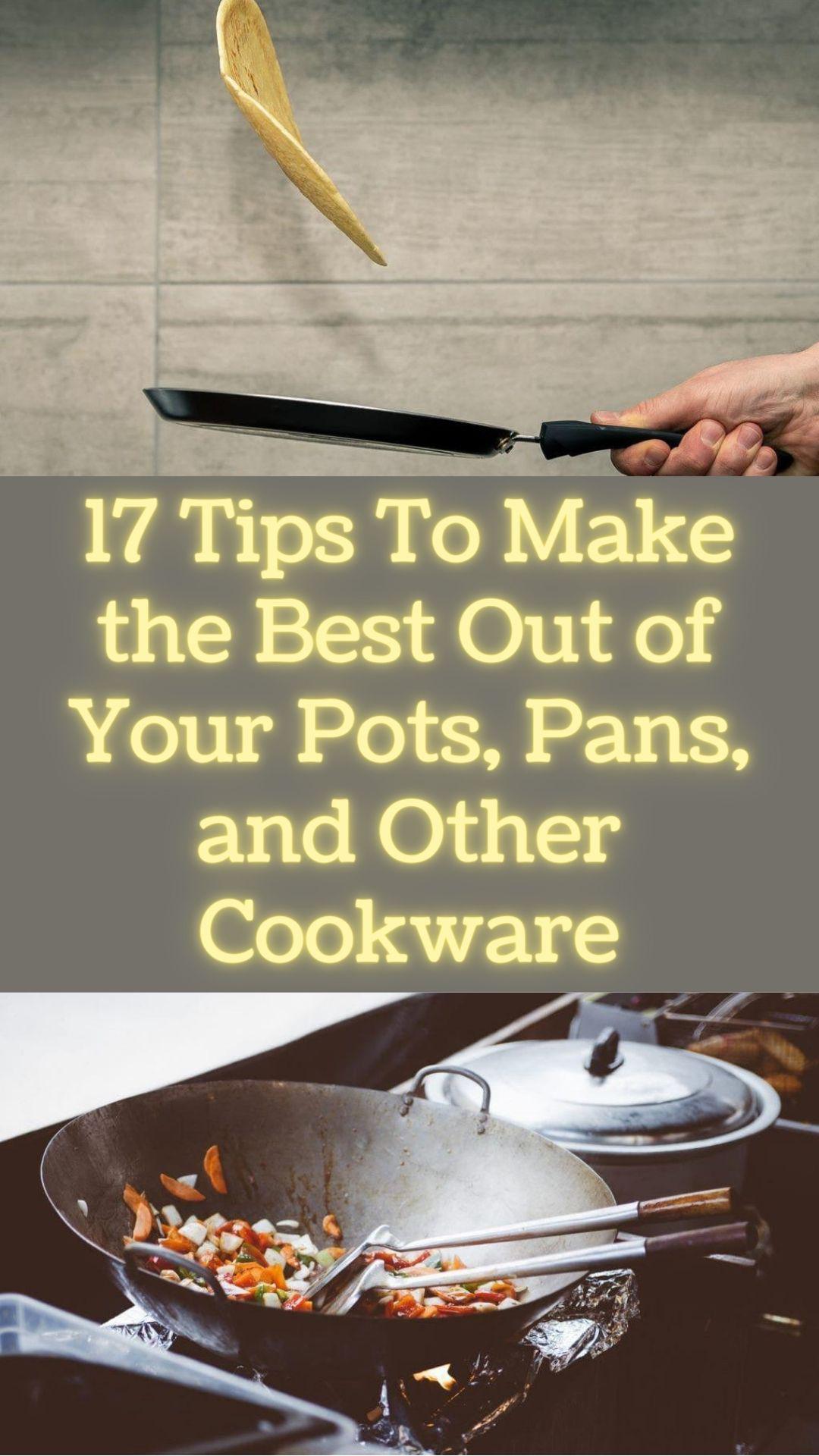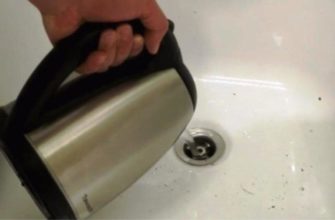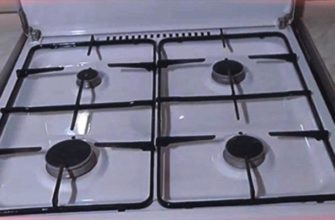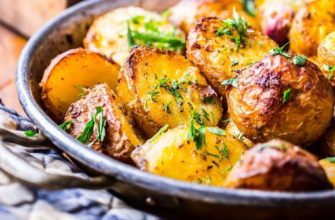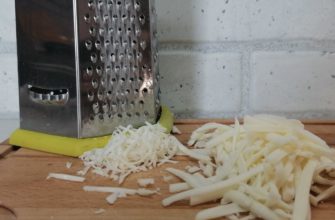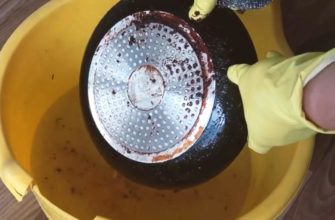- 1. Look at the Stove Before Going to the Store
- 2. Choose Aluminum Cookware if You Are Short on Cash
- 3. Avoid Allergenic Cookware
- 4. Pre-assembled Sets Can Be a Waste of Money
- 5. Best Option for the Environmentally Conscious
- 6. How to Season Your Cast Iron Skillet
- 7. Cooking Pasta in a Frying Pan
- 8. You Can “Handle” the Spoon
- 9. Flipping the Script
- 10. Spreading the Oil in Style
- 11. Don’t Heat Your Empty Nonstick Pan Over High Heat
- 12. It’s Time for Skillet Pizza
- 13. Getting Rid of Burnt Food
- 14. Baking Soda + Vinegar = Clean
- 15. 1940’s Housewife’s Cleaning Trick
- 16. Tips for Organizing Your Pots and Pans
- 17. Repurposing Your Old Skillet
- Conclusion
Managing pots, pans, and other cookware can be a headache. If you use these simple, beginner-friendly tips, you will make cooking, cleaning, and storing your cookware much easier.
The number of cookware choices on the market can make your head spin, even if you are an experienced cook. Pots, pans, griddles, sautérs, skillets, braziers, dutch ovens, and saucepans — the list goes on and on. You probably wouldn’t know how to use and care for them all unless you are chef Gordon Ramsay (or his mother). No worries! We have gathered a list of 17 amazing tips that will help you cover all the bases from buying, and cooking, to arranging, cleaning, and even repurposing your various pots and pans!
1. Look at the Stove Before Going to the Store
You should choose your cookware based on the kind of stove you have, specifically your heat source. While all pans and pots can be used for cooking on a gas stove, other heat sources require specific cookware.
IMPORTANT: If you have an induction stove, regular pans made from ceramic, glass, copper, or aluminum won’t work. Opt for steel or cast iron pans or those that have a magnetic layer at the bottom.
2. Choose Aluminum Cookware if You Are Short on Cash
Beginner cooks can buy cheap aluminum pans. If you want to try out a new specialty pan to see whether it fits your cooking style, aluminum will do the job. If you like the pan, opt for a cast iron version in the future, or at least upgrade to a hard-anodized one. Aluminum has two downsides: it’s not suitable for very high temperatures and acidic foods.
3. Avoid Allergenic Cookware
Do you have a nickel allergy? Avoid copper and stainless steel pots and pans. Is anyone in your family suffering from hemochromatosis? Then famous cast iron pans are not an option, since they will leak iron into your food.
4. Pre-assembled Sets Can Be a Waste of Money
Pre-assembled cookware sets look nice in ads. But unless you have a really large family to cook for, avoid them. Buying massive sets will leave you with pots and pans you will never use. The best buying strategy is getting one premium quality piece at a time.
IMPORTANT: Quality pots and pans are an investment. They will last you decades and won’t go out of style.
5. Best Option for the Environmentally Conscious
Which cookware material is the greenest of them all? It’s ceramic! Ceramic pots and pans have nonstick properties and can be safely disposed of if you break them. This material has no chemical additives like Teflon and doesn’t react with acidic food. You will also use much less oil when cooking.
IMPORTANT: You can find affordable, standard-sized cookware at a restaurant supply store. It will simplify your cooking since you won’t be needing to adjust your recipes.
6. How to Season Your Cast Iron Skillet
Cast iron pans are great, but you need to season them to prevent food from sticking.
- Set the oven to 400 °F
- Coat your pan except for the handle with a layer of coconut oil or lard.
- Put your pan in an oven for an hour.
- Place a baking sheet under the pan to catch oil droplets.
- After your pan cools down, wipe it with a towel.
IMPORTANT: If the food begins to stick or the surface starts looking gray, repeat the procedure. You will have to re-season your cast iron pan 2-3 times a year.
7. Cooking Pasta in a Frying Pan
You don’t need a pot to cook your pasta. Using a frying pan is much faster, and you won’t need a colander to dry your pasta, since most of the water will boil away. You can use the remaining thickened liquid as a base for sauces.
8. You Can “Handle” the Spoon
You have probably noticed a large hole in the handle of your frying pan. No, it’s not just for hanging. If you need a safe and convenient place to stash your wooden spoon, use that hole. It’s actually designed as a spoon rest. Amazing, isn’t it? And your countertop stays clean. It’s a trick that not every professional chef knows about.
9. Flipping the Script
If you like making grilled cheese sandwiches in your pan, but hate turning them, use this ingenious trick. Instead of flipping a sandwich with the spatula, use the spatula to hold it and flip your pan! Make the pan touch the ungrilled side of the sandwich and set it down.
IMPORTANT: It’s better to avoid this method if you have too much oil in the pan and are cooking over an open fire.
10. Spreading the Oil in Style
Spreading the oil evenly across the pan when making pancakes can be a challenge. However, there’s a 4-step trick that pro chefs use to avoid spending too much oil.
- Take a serviette and fold it like a pyramid.
- Dip its end in oil when you need to lubricate the pan.
- Move the serviette around to create an even layer of oil.
- Repeat the previous steps if your pan becomes dry.
Voila!
11. Don’t Heat Your Empty Nonstick Pan Over High Heat
The Teflon layer can break down releasing toxic substances into the air. If you “like it hot” and are concerned about your health, choose cookware that is labeled “eco-friendly.” A better alternative might be ceramic or cast iron pans.
12. It’s Time for Skillet Pizza
Do you want your leftover slice of pizza to be fresh and crispy like it was right after the delivery? Put it in your skillet and cook over medium heat with a lid on. After a couple of minutes, you will have your crispy, mouth-watering snack.
13. Getting Rid of Burnt Food
Aluminum foil is great not only for conspiracy theories. Your trays, pots, and pans will shine like new if you clean them with a folded piece of aluminum foil. Make a small ball out of it, and fill your pan with hot water and detergent. Scrub it gently with aluminum foil.
IMPORTANT: If you don’t have aluminum foil at hand, use sugar cubes instead. Don’t forget to remove extra water before using sugar to scrub your pots.
14. Baking Soda + Vinegar = Clean
This is a classic one. Mix baking soda and vinegar to get rid of burnt food and old spots. Place a thin layer of baking soda on the surface of your pan or tray. Mix 1/3 cup of vinegar and 1 cup of hot water. Pour the solution into the pan. After the mixture stops bubbling, start cleaning.
15. 1940’s Housewife’s Cleaning Trick
Oxalic acid is a common component in cleaning solutions. But there’s a natural source of it that just might grow in your garden. Take rhubarb and boil it for 10-15 minutes in a burned pot or pan. It’s better to use leaves than stems since they contain more oxalic acid. Always wear rubber gloves and rinse your cookware thoroughly afterward.
16. Tips for Organizing Your Pots and Pans
Pots, pans, and griddles can take way too much space. Use these tips to fit them even in a small kitchen.
- Buy wire pot organizers to stack your pots and pans, and save some space in your pantry.
- You will fit more pans inside a cabinet if you hang them using hooks attached to the top.
- Fix a towel bar to the wall and use S-shaped hooks to hang your pots.
- Hang your cookware from the ceiling. It will look cool and save you a lot of shelf space.
- Small tension rods can be used to organize and separate your pans inside a cabinet.
- Install a pull-out cabinet organizer with hooks. You won’t have to bend over to pull out your pans anymore from the floor cabinet.
17. Repurposing Your Old Skillet
If you have a shallow pan like a skillet that you no longer use, make a birdbath out of it for your garden. It provides the perfect depth for birds to drink and bathe. Decorate it any way you want.
Conclusion
There are dozens of tricks and tips that you can use to make cooking easier and more fun. Start with the 17 tips that we have listed above, and you will have a much better cooking experience from now on. Don’t forget to share them with others!















